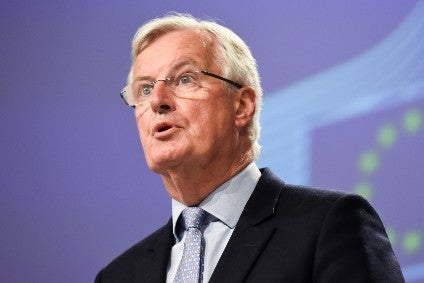
Agri-food bodies operating in the EU have warned of a “growing risk” the UK and the EU will not have time to strike a free-trade deal by the end of the year.
In a join statement, Copa and Cogeca, Celcaa – which represents traders of agricultural commodities – and FoodDrinkEurope, the food-manufacturing organisation, called for “alternative, temporary arrangements” to be introduced from the start of next year should an agreement not be reached.

Discover B2B Marketing That Performs
Combine business intelligence and editorial excellence to reach engaged professionals across 36 leading media platforms.
The trade associations said: “The failure to conclude a zero-tariff, zero-quota FTA [free-trade agreement] would have serious consequences for the agri-food sector both in the EU and the UK.”
The UK formally left the EU on 31 January. At that point, the UK entered the so-called “transition” or “implementation” period of 11 months when the country remained in the EU customs union and single market.
London has until the end of June to ask for that period to be extended into next year. UK Prime Minister Boris Johnson has so far ruled out the prospect of an extension.
The UK and the EU have until the end of this calendar year to agree a free-trade deal. London has insisted its focus is on securing a free-trade agreement with the EU by the end of 2020, rather than considering an extension to the transition period.

US Tariffs are shifting - will you react or anticipate?
Don’t let policy changes catch you off guard. Stay proactive with real-time data and expert analysis.
By GlobalDataHowever, there is some concern in business circles the two sides will not be able to reach agreement by the end of the year, prompting what has been called a “cliff-edge” break to the UK’s access to the EU single market.
“The introduction of tariffs, combined with the potential for regulatory divergence, would severely disrupt integrated supply chains,” the statement from the European agri-food partners read.
London and Brussels have conducted four rounds of talks over a free-trade deal. EU negotiator Michel Barnier said last week: “There have been no significant areas of progress,” adding: “We have always been open to the possibility of an extension of one or two years – as is possible under the exit agreement. And our door remains open.”
On Friday (5 May), during the UK government’s daily briefing on the Covid-19 pandemic, Matt Hancock, the country’s Health Secretary, said he “very much hopes” a no-deal exit is avoided.
However, he added: “It’s that any agreement we reach must reflect the fact that the UK is an independent sovereign state. We’re working very hard and will accelerate the work to make progress in talks by the end of the year so that we can put into place the vision that has already been agreed between the UK and the EU which is based within the political declaration.”
In their statement, Copa and Cogeca, Celcaa and FoodDrinkEurope said they are “particularly concerned about the limited amount of time available in which to conclude and ratify a trade deal”.
They added: “We regret that the UK government is currently opposed to any extension of the post-Brexit transition period beyond 2020. The transition should be of sufficient length for businesses to plan and prepare for any FTA arrangements, and to avoid a cliff-edge situation.
“We urge the consideration of alternative, temporary arrangements that could be implemented from the start of 2021 should it not prove possible to conclude an FTA this year. Such temporary arrangements, which would need to preserve tariff and quota free trade, would afford additional time for negotiators while minimising disruption for operators already coping with significant impacts of Covid-19.
“The combination of no agreement and no extension of transitional arrangements would have significant negative consequences for the EU agri-food sector. These can be expected to include a major decrease in export volumes from the EU to the UK, a significant fall in revenue, and consequential job losses. The impact on SMEs, farmers and agri-cooperatives would be particularly detrimental.”





